Personal Service Corporation
Maximize Tax Efficiency with Personal Service Corporation Structuring
If you're a professional operating under your own name or a specialized service business, electing to be taxed as a Personal Service Corporation (PSC) can offer significant tax implications—both good and bad. At John W. Robinson, CPA PLLC, we help professionals like doctors, lawyers, consultants, engineers, and creatives navigate the complex rules around PSCs to make sure you're not overpaying taxes or falling into IRS traps.
Let our expertise protect your bottom line and unlock smarter business structuring.
What Is a Personal Service Corporation?
A Personal Service Corporation is a special tax classification defined by the IRS for businesses where the primary activity is the performance of personal services, and the owners or employees performing those services own most of the company’s stock.
In other words, if you and your team provide skilled, professional services—and you own most of your business—you may qualify (or be required) to be taxed as a PSC.
Examples include:
- Medical practices owned by physicians
- Law firms operated by attorneys
- Accounting firms (like ours!)
- Architectural and engineering companies
- Consulting or financial advisory firms
We help determine whether your business qualifies—and what it means for your taxes.
What Are the Disadvantages of a Personal Service Corporation?
While a Personal Service Corporation offers some benefits, it also comes with tax challenges that can be costly if not managed properly.
Some key disadvantages include:
- Flat 21% federal tax rate: Unlike other corporations that benefit from tax brackets, PSCs are taxed at a flat corporate rate.
- Double taxation risk: If not structured properly, you may be taxed on corporate earnings and again on dividends.
- Stricter IRS scrutiny: The IRS watches PSCs closely for tax avoidance.
- Limited deductions: Many deductions available to standard C-Corps may be restricted under PSC rules.
At John W. Robinson, CPA PLLC, we specialize in identifying these challenges early and building smart, legal strategies to reduce their impact.
Why Choose a PSC—and Who Should Avoid It?
Our clients often ask: “Should I classify as a Personal Service Corporation or use an LLC or S-Corp?”
The answer depends on your business goals and financial situation.
A PSC may be right for you if:
- You are a professional service provider (lawyer, doctor, accountant, etc.)
- Your corporation is 95% owned by employees performing those services
- You want corporate-level liability protection and certain tax benefits
However, you may want to avoid a PSC if:
- You plan to retain large earnings in the company (risk of high taxes)
- You want more tax flexibility (an S-Corp or LLC may serve you better)
- You're concerned about double taxation and IRS compliance burden
We help you weigh the pros and cons so you make the best decision for your business.
What’s the Difference Between a Personal Corporation and an LLC?
It’s a common confusion—LLCs and Personal Service Corporations both offer legal protections, but differ significantly in tax treatment and structure.
| Feature | Personal Service Corporation | LLC |
|---|---|---|
| Ownership | Stockholders | Members |
| Taxes | Flat 21% corporate rate | Pass-through (or corporate, if elected) |
| IRS Treatment | Stricter oversight | More flexibility |
| Best For | Professional service firms | Freelancers, consultants, small businesses |
When you work with us, we guide you through entity comparison, cost-benefit analysis, and IRS qualification to ensure you're legally and financially set up for success.
What Is Considered a Personal Service Business?
Not every service qualifies. The IRS has specific criteria for what counts as a personal service business eligible (or required) to be a PSC.
The services must fall under specific fields, including:
- Accounting
- Consulting
- Health and medicine
- Law
- Engineering and architecture
- Actuarial science
- Performing arts
If at least 95% of your business activities are in these areas, and the service providers own most of the company, the IRS may classify you as a PSC.
John W. Robinson, CPA PLLC ensures you’re in full compliance—avoiding misclassification penalties while optimizing your tax position.
Our Personal Service Corporation Services Include:
Working with our team means your business entity isn’t just set up—it’s set up right.
Here’s what you get:
- Entity structure analysis (LLC vs S-Corp vs PSC)
- PSC qualification assessment
- IRS form preparation and submission
- Custom tax strategy to reduce flat-rate tax burden
- Ongoing compliance and reporting support
- Audit preparation if you’re ever under review
- Coordinated payroll, retirement, and dividend planning
This isn’t just a filing—it’s a long-term plan for tax efficiency and business protection.
Why Work With John W. Robinson, CPA PLLC?
We’re not just accountants—we’re your strategic advisors, especially when it comes to complex tax classifications like Personal Service Corporations.
Here’s why NYC professionals and small business owners choose us:
- Deep understanding of PSC regulations and IRS nuances
- Tailored entity planning—not one-size-fits-all packages
- 100s of satisfied clients across professional industries
- Year-round support, not just during tax season
- Straight answers, no fluff—we make your structure work for you
Let us help you choose the right path—and make sure it pays off.
FAQs About Personal Service Corporations
1. What is an example of a personal service corporation?
A dental office owned and operated by a licensed dentist providing services directly to patients is a common example. Other examples include legal practices, accounting firms, and consulting agencies where the owner is also the service provider.
2. What are the tax implications of forming a PSC?
A PSC is taxed at a flat 21% federal rate with no progressive brackets. While this may seem low, it can result in higher taxes if income would have fallen under lower brackets in a pass-through structure. PSCs may also face double taxation if profits are distributed as dividends. We design strategies to minimize this.
3. Can I convert my LLC to a Personal Service Corporation?
Yes, with proper planning and IRS approval. However, switching comes with tax considerations, legal implications, and administrative steps. We’ll walk you through the conversion process and make sure it’s the right fit before making the leap.
4. Is a PSC better than an S-Corp?
Not always. It depends on your business’s income structure, goals, and industry. S-Corps offer pass-through taxation which can reduce tax liability for some professionals. We offer side-by-side comparisons to help you decide what’s best for your specific situation.
5. How do I avoid double taxation as a PSC?
Strategic salary and benefit planning can reduce retained earnings and limit dividend exposure. We help structure your compensation in a way that meets IRS standards while minimizing the corporate tax hit.
Secure Your Financial Future with Expert PSC Guidance
At John W. Robinson, CPA PLLC, we don’t just help you choose a business entity—we help you choose a smarter future. If you’re a professional service provider in NYC or beyond, our Personal Service Corporation services give you the clarity, compliance, and confidence you need.
📞 Call us today at (914) 266-2724
📍 Visit us at 63 New Main St, Haverstraw, NY 10927
📧 Or message us to schedule your PSC consultation






